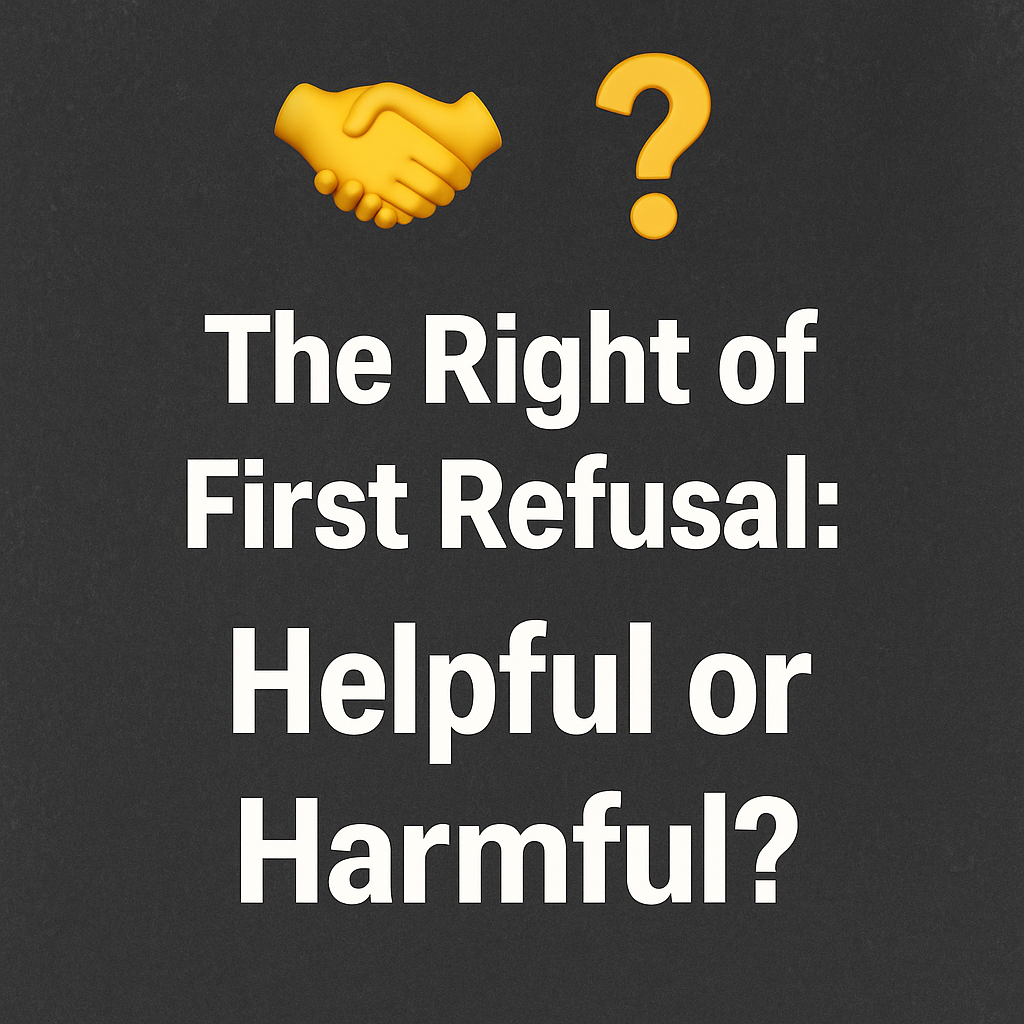
When parents separate, custody agreements become more than just pieces of paper—they become the rulebook for how families live, grow, and sometimes clash. Every clause written into that agreement carries weight, shaping the daily rhythm of parenting and the long-term stability of a child’s life.
One clause that often sparks both hope and headache is the Right of First Refusal (ROFR). At first glance, it sounds heroic, even noble. The idea is simple: if one parent can’t be with the child, the other parent should get the first chance before a babysitter, daycare, or even a new partner steps in. It feels like a safeguard to ensure kids spend as much time as possible with their parents—the people who matter most.
But family law has a way of turning simple ideas into complex realities. Once you step past the theory and into the actual day-to-day of co-parenting, this so-called “hero clause” often reveals a hidden side. What looked like a guarantee of fairness and extra parent time can quickly morph into a source of arguments, misunderstandings, and even legal battles.
My Story with the Right of First Refusal
I know this because I lived it. In every parenting plan I drafted, I included the Right of First Refusal. For me, it felt like the fairest way to protect my time with my kids. The version I always agreed to was a 24-hour ROFR. On paper, it seemed straightforward: if one parent couldn’t be with the kids for 24 hours or more, the other parent had the right to step in.
But here’s the catch: 24 hours meant exactly that. Not 23. Not 12. Not overnight. The clause didn’t trigger until the 24th hour. And that strict wording created more problems than it solved.
If I had to travel for 20 hours? No ROFR. If my co-parent had a full day of work and an evening out? Still no ROFR. The ambiguity of the details meant we were constantly butting heads about what “counted” and what didn’t.
Instead of keeping things simple, the 24-hour ROFR became a breeding ground for conflict. What I thought was a tool for fairness ended up being a reminder that clarity matters more than good intentions in any parenting plan.
What is the Right of First Refusal?
The ROFR is a clause in parenting plans that says: if one parent can’t care for the child during their scheduled time (whether it’s for work, travel, or even just a night out), they must first offer that time to the other parent before arranging alternate childcare.
On paper, it seems fair. Why hire a sitter if Mom or Dad is available? It feels like a win for the child, who gets extra time with their parent, and a win for parents who want maximum involvement.
But the reality isn’t always that smooth.
Why It Can Be a Hero Clause
More parent time: Children benefit from extra contact with both parents.
Consistency: Kids know they’ll be with family instead of a revolving door of caregivers.
Flexibility: Parents who want to be more involved get extra opportunities.
When parents have low conflict and strong communication, the ROFR can genuinely work like a charm.
Where It Becomes a Hidden Hassle
- Ambiguity: How long must a parent be unavailable before ROFR kicks in? An hour? Overnight? A weekend? Courts often leave this vague, which causes disputes.
- Micromanagement: If enforced too strictly, every work meeting, date night, or errand could become a battleground.
- Weaponization: In high-conflict situations, ROFR is often abused. Parents might invoke it not to spend more time with their child, but to control or disrupt the other parent’s life.
Educational Illustrative Language Example for ROFR
When I coach parents, I stress that the ROFR can only work if the details are crystal clear. Here’s an example of how I help parents write it in a way that minimizes conflict:
RIGHT OF FIRST REFUSAL CLAUSE
I. If either parent will be unavailable to personally care for the minor child(ren) for more than twenty-four (24) consecutive hours during their scheduled parenting time, and the other parent resides within close proximity, the unavailable parent shall first offer the other parent the opportunity to care for the child(ren) before arranging third-party care.
The offering parent shall provide as much advance notice as reasonably possible, including the anticipated duration and reason for the unavailability. The responding parent shall reply within a reasonable timeframe, not to exceed four (4) hours from the time of notification. If the other parent declines or fails to respond within the stated time, the offering parent may secure alternate care for that specific period without penalty or future obligation.
This provision does not apply in cases of brief, routine absences (e.g., errands, appointments, short-term supervision by known relatives). It is intended for extended absences during overnight periods or regular caregiving windows.
II. This clause is subject to reasonable exceptions based on the age of the child(ren), established routines, and availability of both parents. It does not apply during vacation or holiday parenting time, where travel considerations may be involved, or in long-distance scenarios. The parents may waive this provision in writing for specific circumstances, including travel or situations involving extended distances between the parents’ residences.
Lightening the Load
Parenting plans are already heavy enough. The Right of First Refusal doesn’t need to add more weight to your shoulders. A few small mindset shifts can ease the strain:
Think child-first, not parent-first. If the clause feels like it’s being used to “score points” rather than help the child, it probably needs adjusting.
Keep it simple. Overly complicated language creates loopholes and frustration. Clear timeframes and clear exceptions prevent nitpicking.
Use tech to your advantage. Parenting apps can track communication, response times, and agreements so there’s less room for “he said, she said.”
Don’t sweat the small stuff. Not every errand, appointment, or dinner out needs to turn into a custody debate. Reserve ROFR for meaningful stretches of time.
By approaching the ROFR with clarity and a lighter touch, parents can reduce the burden it places on their relationship and keep the focus where it belongs—on the child’s stability and peace of mind.
Bottom Line
The Right of First Refusal can be both a blessing and a burden. In its best form, it’s a hero clause—a safeguard that allows children to strengthen their bond with both parents, offering them stability, continuity, and the reassurance that Mom or Dad will always come first before a sitter or third party. For parents who communicate well, it becomes a natural extension of teamwork: If I can’t be there, you step in.
But the same clause, left vague or dropped into a high-conflict situation, can quickly turn into a hidden hassle. Instead of supporting the child, it can fuel disputes: constant text wars about whether a dinner out “counts,” accusations of withholding opportunities, or rigid interpretations that micromanage the other parent’s time. In those cases, the ROFR stops being about the child’s best interest and starts being another battlefield for control.
The dividing line is often twofold:
The parents’ ability to cooperate. Without a foundation of trust or at least civility, the ROFR is more likely to be weaponized than honored.
The clarity of the agreement. Ambiguity breeds conflict. A well-drafted clause that spells out timelines, exceptions, and communication methods will do far more to reduce tension than one that leaves the details open to interpretation.
If your co-parenting relationship is still in a high-conflict zone, adding the ROFR may not serve you—it can become more of a trap than a tool. On the other hand, if you and your co-parent have built some trust, or at least reliable communication, this clause can genuinely create more stability and open doors to extra quality time with your kids.
✨ Pro tip: Before agreeing to the ROFR, don’t just picture the ideal day where everyone gets along. Picture the worst possible day with your co-parent—the day they’re short-tempered, unresponsive, or suspicious of your intentions. If the clause still feels workable under that pressure test, it’s likely a good fit for your parenting plan.
Legal Disclaimer
Elevatus Coaching LLC provides educational resources, coaching frameworks, and strategic guidance to help individuals navigate co-parenting, post-divorce transitions, and personal development. All materials, including the Ironclad Parenting Plan Framework System, are designed for educational and informational purposes only. Nothing provided by Elevatus Coaching — whether written, spoken, or delivered through products, sessions, or digital content — constitutes legal advice, legal representation, or the practice of law.
🔄Did you find this article helpful? Share it!

About the Author - Danny DeJesus
Danny De Jesus is a transformational resilience thought leader, strategic thinker, and the founder of Elevatus Coaching—a practice built to help people rebuild their lives after major change. Drawing from his own experiences with divorce, co-parenting, and career shifts, he created the C2R2E Framework to guide people from collapse to elevation with clarity and confidence. Through the Elevatus Blog, he shares insights for anyone navigating disruption, rebuilding direction, or shaping a new chapter with purpose.
